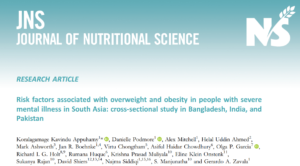Obesity is one of the major contributors to the excess mortality seen in people with severe mental illness (SMI) and in low- and middle-income countries people with SMI may be at an even greater risk. In this study, we aimed to determine the prevalence of obesity and overweight in people with SMI and investigate the association of obesity and overweight with sociodemographic variables, other physical comorbidities, and health-risk behaviours. This was a multi-country cross-sectional survey study where data were collected from 3989 adults with SMI from three specialist mental health institutions in Bangladesh, India, and Pakistan.


